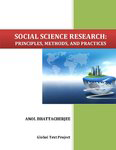Social Science Research: Principles, Methods, and Practices
Editorial: Global Text Project
Licencia: Creative Commons (by-nc-sa)
Autor(es): Anol Bhattacherjee
This book is designed to introduce doctoral and graduate students to the process of scientific research in the social sciences, business, education, public health, and related disciplines. This book is based on my lecture materials developed over a decade of teaching the doctoral-level class on Research Methods at the University of South Florida. The target audience for this book includes Ph.D. and graduate students, junior researchers, and professors teaching courses on research methods, although senior researchers can also use this book as a handy and compact reference.
The first and most important question potential readers should have about this book is how is it different from other textbooks on the market? Well, there are four key differences. First, unlike other text books, this book is not just about “research methods” (empirical data collection and analysis) but about the entire “research process” from start to end. Research method is only one phase in that research process, and possibly the easiest and most structure done. Most text books cover research methods in depth, but leave out the more challenging, less structured, and probably more important issues such as theorizing and thinking like a researcher, which are often prerequisites of empirical research. In my experience, most doctoral students become fairly competent at research methods during their Ph.D. years, but struggle to generate interesting or useful research questions or build scientific theories. To address this deficit, I have devoted entire chapters to topics such as “Thinking Like a Researcher” and “Theories in Scientific Research”, which are essential skills for a junior researcher.
Compartir:
Una vez que el usuario haya visto al menos un documento, este fragmento será visible.


